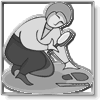3.2 Reading Projects-Unit 3
Criteria for Your Zeef Page
Author
Find and Evaluate the Author

Before information is used or cited, it is important to find out who the author is and what makes the author qualified to write on the subject.
Online articles and web pages often do not clearly include the name of the author. When this happens, it helps to know several investigative techniques.
from: https://21cif.com/rkitp/course/twohourworkshop/authorfind.html
Techniques to locate the author
Here are examples of pages where the author is not clearly named:
Use these techniques to locate authors:
-
If looking on the page doesn't reveal an author's name, look on the Web site. Scroll to the bottom.
-
Try truncating the url to see if there are clues about authorship or links to an author on other pages--remove the end of the address back to a significant break ( / ) or the root of the site.
-
If the site provides links to 'about us' or 'contact us,' check there for author information.
-
If the site provides a search engine, enter the name of the article and see if information about the author is retrieved. This may require careful reading.
-
Search a different site. Enter information about the article in search engines like Google and see if any information about the author is retrieved. This may require careful reading.
from: https://21cif.com/rkitp/course/twohourworkshop/authorfind_help.html
Once an author's name is available, search for information using the author's name in Google or a similar search engine. Entering keywords such as 'education' or "employment' in addition to the author's name may help retrieve information about where the author attended school, graduated or works. Be nosy -- look for facts and check those out to see if they hold up.
Also pay attention to the way an author expresses opinions or facts. Are there indications of bias?